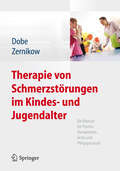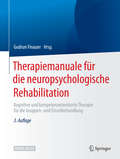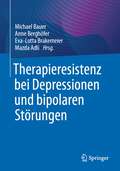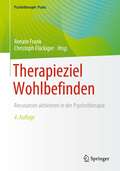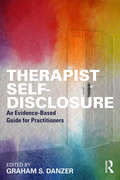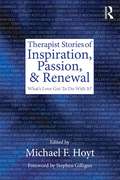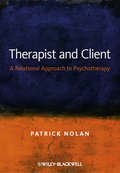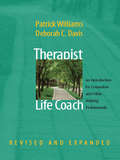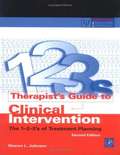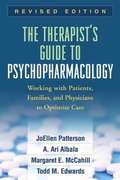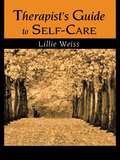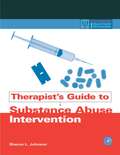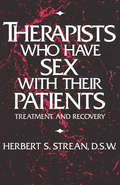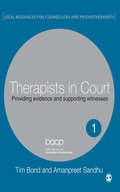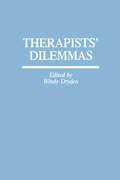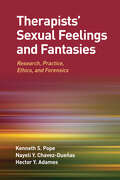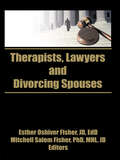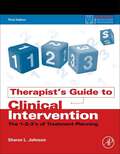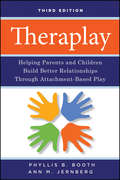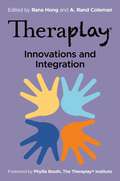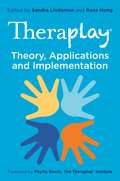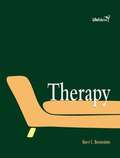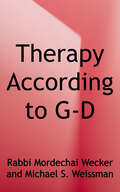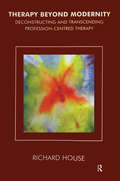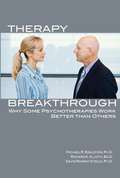- Table View
- List View
Therapie von Schmerzstörungen im Kindes- und Jugendalter
by Michael Dobe Boris ZernikowCa. 300.000 Kinder- und Jugendliche sind in Deutschland von chronischen Schmerzen betroffen, fehlen damit in der Schule und sind in ihrem sozialen Leben stark benachteiligt. Gezielt helfen kann nur der jenige, der sich mit dem Krankheitsbild, der notwendigen Diagnostik und Therapie ausreichend auskennt. Das Buch stellt das erprobte stationäre Schmerztherapieprogramm des Deutschen Kinderschmerzzentrums (DKSZ) an der Vestischen Kinder- und Jugenklinik in Datteln - Universität Witten/Herdecke vor. Es zeigt die professionelle Behandlung und den Umgang mit schmerzkranken Kindern und Jugendlichen auf: · Fachwissen, um die Ursache von chronischem Schmerz zu verstehen · Erfolgreiche Behandlungsmöglichkeiten basierend auf langjähriger, klinischer Erfahrung · Tages- und Therapiestruktur, Interventionen des Pflege- und Erziehungsteams (PET) und anderer beteiligter Berufsgruppen · Plus: Arbeitsmaterialien zur Erhebung von Ressourcen und besonderen Belastungsfaktoren Ambulante und stationäre Einrichtungen können mit dem Konzept eine wirksame stationäre Schmerztherapie für Kinder mit einer Schmerzstörung anbieten. Für ambulant tätige Psychotherapeuten, Pädiater und Schmerztherapeuten, die gezielt und konkret einen Überblick über Therapiemöglichkeiten und Inteventionen schmerzkranker Kinder und deren Familien suchen.
Therapiemanuale für die neuropsychologische Rehabilitation: Kognitive und kompetenzorientierte Therapie für die Gruppen- und Einzelbehandlung
by Gudrun FinauerHandbuch und Therapiematerialien (Übungsbögen, Protokollbögen usw.) für die (kosteneffiziente) Gruppenarbeit und Einzeltherapien mit Reha-Patienten nach Hirnschädigungen. Genaue Arbeitsanleitungen und umfassender Materialfundus für Planung und Ausführung klar strukturierter, wissenschaftlich evaluierter und praktisch erprobter Gruppenangebote zur Therapie kognitiver Hirnleistungen und Kompensation von Störungen. Die Arbeitsanleitungen beinhalten: Ablauf der Therapiestunden mit präzisen Zeitvorgaben, Beschreibung des jeweiligen Hauptthemas und relevanter Unterthemen, dazu jeweils Übungsblätter und „Hausaufgaben", Tipps bei Problemen im Gruppenprozess. Für erfahrene ebenso wie unerfahrene Therapeuten, die mit den Therapiemanualen selbstständig effiziente Gruppenangebote planen und durchführen können. NEU in der 2. Auflage: Lösungsvorschläge zu allen Übungen des Schwerpunkts „Exekutive Funktionen" (Kap. 4).
Therapieresistenz bei Depressionen und bipolaren Störungen
by Michael Bauer Anne Berghöfer Mazda Adli Eva-Lotta BrakemeierTherapieresistente depressive und bipolare Störungen stellen ungebrochen eine klinische Herausforderung dar: Therapeutisches Nichtansprechen bzw. Therapieresistenz depressiver und bipolarer Erkrankungen sind nicht nur häufig, sie erfordern oft auch eine stationäre Behandlung. Für Betroffene und Angehörige bedeutet das erhebliche Einschränkungen der Lebensqualität und der sozialen und beruflichen Funktionsfähigkeit. Therapieresistente Verläufe verursachen gleichzeitig sehr hohe Behandlungskosten.Um dieser Herausforderung zu begegnen, steht heute ein breites Spektrum pharmakologischer, psychotherapeutischer und psychosozialer Behandlungsmöglichkeiten zur Verfügung, das spezielle Kenntnisse und Erfahrungen voraussetzt. In diesem Buch stellen daher namhafte ExpertInnen in kurzen, prägnanten Kapiteln wissenschaftlich fundiert und mit hohem Praxisbezug den aktuellen Wissensstand dar und bieten Leitlinien für die Behandlung in Klinik und Praxis.Dabei werden auch neue Methoden, wie weiterentwickelte Hirnstimulationsverfahren, Chancen und Grenzen pharmakogenetischer Methoden zur präziseren Therapieempfehlung („bedside genotyping“), neue psychotherapeutische und pharmakologische Ansätze sowie innovative integrierte Versorgungsformen berücksichtigt. Das Buch richtet sich an PsychiaterInnen, NervenärztInnen, PsychotherapeutInnen und PsychologInnen, insbesondere im stationären Setting, aber auch in spezialisierten Praxen, sowie WissenschaftlerInnen von Forschungseinrichtungen und Industrieunternehmen.
Therapieziel Wohlbefinden: Ressourcen aktivieren in der Psychotherapie (Psychotherapie: Praxis)
by Renate Frank Christoph FlückigerDieses Buch stellt Psychotherapieansätze vor, die sich spezifisch auf Wohlbefinden, menschliche Stärken und seelische Gesundheit konzentrieren, u. a. ressourcenorientierte Psychotherapie, euthyme Therapie, Well-Being-Therapie, Mindfulness Based Therapy sowie narrative und Sinn fördernde Ansätze. Positive Psychologie und Wohlbefindensforschung finden immer mehr Beachtung: Was sind die Auswirkungen von Wohlbefinden, positiven Gefühlen, Zufriedenheit, konstruktiven Gedanken und eigenen Stärken? Wie begünstigen diese auch angesichts von Stress und Lebensbeeinträchtigungen ein erfülltes, produktives Leben? Und: Wie lässt sich Wohlbefinden im Rahmen einer Psychotherapie ganz direkt fördern? Geschrieben für ... Psychologische und Ärztliche Psychotherapeuten, Kinder- und Jugendlichenpsychotherapeuten, Psychiater, Klinische Psychologen. Über die Herausgeber:innen: Dr. Renate Frank, promovierte Psychologin und Psychotherapeutin. Sie leitete die verhaltenstherapeutische Ambulanz der Universität Gießen; ihre Arbeits- und Forschungsschwerpunkte: Wohlbefinden und Lebensqualität. Prof. Dr. phil. Christoph Flückiger, Psychotherapeut und Supervisor, Leiter der Spezialpraxis für Generalisierte Angststörungen Universität Zürich; seine Forschungs- und Lehrinteressen: Erforschung allgemeiner Wirkfaktoren in der Psychotherapie und in psychologischen Interventionen.
Therapist Self-Disclosure: An Evidence-Based Guide for Practitioners
by Graham S. DanzerTherapist Self-Disclosure gives clinicians professional and practical guidance on how and when to self-disclose in therapy. Chapters weave together theory, research, case studies, and applications to examine types of self-disclosure, timing, factors and dynamics of the therapeutic relationship, ethics in practice, and cultural, demographic, and vulnerability factors. Chapter authors then examine self-disclosure with specific client populations, including clients who are LGBTQ, Christian, multicultural, suffering from eating disorders or trauma, in forensic settings, at risk for suicide, with an intellectual disability, or are in recovery for substance abuse.This book will very helpful to graduate students, early career practitioners, and more seasoned professionals who have wrestled with decisions about whether to self-disclose under various clinical circumstances.
Therapist Stories of Inspiration, Passion, and Renewal: What's Love Got To Do With It?
by Edited by Michael F. HoytWhy do you practice psychotherapy? In this exciting volume, some of the field’s leading therapists tell true stories which evoke the pleasures, joys, and satisfactions that inspire passion for therapeutic work. Rather than focusing on the stresses and strains of being a clinician, these dramatic, poignant, wise, sometimes humorous and always soulful stories will help you gain (or regain) hope and excitement, and ultimately inspire a recommitment to a profession that, at its heart and soul, is about helping people.
Therapist and Client
by Patrick NolanTherapist and Client: A Relational Approach to Psychotherapy provides a guide to the fundamental interpersonal elements of the therapeutic relationship that make it the most effective factor in therapy.Presents the fundamental interpersonal elements that make the therapeutic relationship the most effective factor in psychotherapyExplores and integrates a range of approaches from various schools, from psychoanalysis to body-oriented psychotherapy and humanistic psychotherapiesOffers clear and practical explanations of the intersubjective aspects of therapyDemonstrates the pivotal need to work in the present moment in order to effect change and tailor therapy to the clientProvides detailed case studies and numerous practical applications of infant research and the unified body-mind perspective increasingly revealed by neuroscience
Therapist as Life Coach: An Introduction for Counselors and Other Helping Professionals (Revised and Expanded)
by Patrick Williams Deborah C. DavisIn 2006, U.S. News and World Report listed coaching as one of the 10 top growing professions. The first edition of Therapist as Life Coach, published in 2002, anticipated this trend, and since its publication it has become a standard for therapists who wish to transition or expand their practices into life coaching. Pat Williams and Deborah C. Davis have finally revised their classic practice-building book for today's therapists and future coaches. Every chapter in this second edition has been updated and rewritten, reflecting the growth of the coaching field and its increasing appeal to not only therapists, but all helping professionals. The book begins by exploring the history of the coaching movement and shows how society is hungry for life coaches. The second part of the book explains in detail the differences and similarities between coaching and therapy, discusses the coaching relationship, and considers some of the skills therapists will need to learn and unlearn in order to reclaim their joyfulness about their work. Professional transition tools such as developing and marketing your practice and honing your coaching skills are discussed at length in Part Three. The final section moves beyond basic life coaching to introduce coaching specialties such as corporate coaching, offers self-care strategies for life coaches, and peeks into the future of life coaching. There is new material throughout, including an overview of recent coaching developments, updated liability concerns, new business opportunities, and a new section on the research about coaching. Coaching gives practitioners the opportunity to break free of managed care and excessive reliance on the insurance industry and to work with a wide range of clients--specifically, those who are not suffering from mental illness but, rather, seeking to maximize their life potential. This book will help you enter this lucrative and personally enriching world with the skills and knowledge you need to build a successful coaching practice.
Therapist's Guide to Clinical Intervention: The 1-2-3's of Treatment Planning (2nd edition)
by Sharon L. JohnsonA must-have reference for clinicians completing insurance forms, participating in managed care, or practicing in treatment settings requiring formalized goals and treatment objectives. This practical, hands-on handbook outlines treatment goals and objectives for each type of psychopathology as defined by the diagnostic and statistical manual by the American Psychiatric Association, identifies skill-building resources, and provides samples of all major professional forms.
Therapist's Guide to Psychopharmacology, Revised Edition
by Joellen Patterson A. Ari AlbalaThis indispensable book provides therapists and counselors with crucial knowledge about psychotropic medications when and how to make medication referrals, how to answer patients' questions and help them handle problems that arise, and how to combine medication and psychotherapy effectively. Ideal for readers without extensive background in neurobiology, the book clearly explains how medications work in the brain and how they affect an individual's emotions, behavior, and relationships. Strategies for collaborating successfully with patients, their family members, and prescribers are discussed in detail. In this edition, psychopharmacology content has been fully updated.
Therapist's Guide to Self-Care
by Lillie WeissPsychotherapy is an increasingly stressful profession. Yet therapists spend most of their time helping clients deal with their stress, not caring for their own. This book is designed as a tool for the experienced counselor, junior therapist, and graduate student, as the issues confronted and discussed herein are relevant to anyone in the field, regardless of experience or expertise. Dr. Weiss has written a book in an easy, conversational tone, filled with concrete examples and blending research findings, clinical experience and theoretical approaches into practical suggestions and sound advice. The book is divided into three parts, discussing therapist concerns and questions that are continually raised, and providing practical tools based on clinical experience and research findings. It will be useful to all mental health professionals who have felt the strain of their practice.
Therapist's Guide to Substance Abuse Intervention
by Sharon L. JohnsonAuthor of AP's bestselling "Therapist's Guide to Clinical Intervention" now turns her attention to substance abuse intervention. The book will follow a similar format to her previous book, presenting information in easy to read outline form, with relevant forms, patient questionnaires, checklists, business documents, etc. Part I discusses the social impact of substance abuse and provides a general overview of the physiological and psychological characteristics of abuse, DSM IV definition of abuse, and classifications of the varying types of drugs. Part II is the main section of the book and covers assessment, different stages of abuse/recovery, and treatment choices. Coverage includes the discussion of myriad self-help choices (e.g. AA), group therapy, brief therapy, and more. Discussion will also include making a determination of treatment as inpatient or outpatient, and issues relevant to special populations (teenagers, geriatrics, comorbidity patients, etc.). Part III presents skill building resources. Part IV covers prevention, quality assurance, and also includes a glossary. The book, Outlines treatment goals and objectives, Outlines for assessing special circumstances, offers skill building resources to supplement treatment.
Therapists Who Have Sex With Their Patients: Treatment And Recovery
by Herbert S. StreanFirst published in 1994. Routledge is an imprint of Taylor & Francis, an informa company.
Therapists in Court: Providing Evidence and Supporting Witnesses (Legal Resources Counsellors & Psychotherapists #Vol. 1)
by Tim Bond Amanpreet SandhuTherapists in Court is the first in a series of handbooks providing legal guidance for practitioners from all the talking therapies, including counseling, psychotherapy and psychology. It is written for practitioners who come into contact with the legal system through their work. Providing practical guidance backed up with illuminating examples, the book is an invaluable source of information in situations such as responding to a solicitor's letter, supporting a witness in their preparation to appear in court, and being called as a witness.
Therapists' Dilemmas
by Windy DrydenThis book attempts to re-create a kind of informal atmosphere where therapists would feel relaxed enough to discuss their dilemmas in public and presents them in an interview format. It is designed for those who are prepared to be personally confronted by the issues raised in the interviews.
Therapists' Sexual Feelings and Fantasies: Research, Practice, Ethics, and Forensics
by Kenneth S. Pope Hector Y. Adames Nayeli Y. Chavez-DueñasThis book offers a concise, practical guide to ethical and legal concerns related to therapists' sexual feelings and fantasies. The psychotherapy profession has always struggled to deal openly with therapists' sexual feelings. Between the often unavoidable fact of sexual attraction, and the potential crossing of boundaries and sexual relationships with clients, there exists a wide range of assumptions, beliefs, feelings, and daydreams that often are suppressed and unspoken—sometimes with devastating consequences. This candid, practical book addresses three distinct areas related to therapists&’ sexual feelings: sexual attractions to clients (including sexual fantasies, dreams, and arousal); the violation of sexual boundaries with clients (including consensual therapist-patient sexual involvement); and forensic issues, including therapists who testify in cases where therapist-patient sex is at issue. The authors offer an extensive review of widespread and changing approaches to this topic in the history of psychotherapy, alongside a comprehensive look at current standards and research findings. They also provide important information for fact and expert witnesses, examining the evolving ethical and legal standards surrounding sexual relationships between therapists and clients, and discuss how to respond to clients to report having been sexually involved with a prior therapist. Incisive reflection questions encourage readers to recognize and respond appropriately to their own feelings in the therapy room.
Therapists, Lawyers, and Divorcing Spouses
by William FisherExperts explore the need for cooperation between the law and helping professions in order to lessen the trauma of the divorce process.
Therapist’s Guide to Clinical Intervention: The 1-2-3's of Treatment Planning
by Sharon L. JohnsonTherapist’s Guide to Clinical Intervention, Third Edition, is an essential reference for providing clinical services and associated case formulations requiring formalized goals and objectives. It is ideal for use in assessment, treatment, consultation, completing insurance forms, and/or participating in managed care. This practical, hand-on book, outlines treatment goals and objectives for each type of psychopathology as defined by the diagnostic and statistical manual by the American Psychiatric Association. It additionally provides skill-building resources and samples of all major professional forms likely to be used in clinical treatment. The third edition conveniently maps individualized treatment plans utilizing evidence-based best practices and standards of care. Diagnostic information is presented by associated disorder or theme for easier access. New special assessments and skill-building entries are included. Also new are numerous website/URLs associated with research articles, and consumer resources have been provided to complement clinical information and patient education. Outlines treatment goals and objectives for DSM-IV diagnoses Presents evidence-based best practices of intervention Provides the basis for assessing special circumstances Offers skill building resources to supplement treatment Contains samples for a wide range of business and clinical forms Supplies websites for additional clinical information and patient education
Theraplay
by Booth Phyllis B. Jernberg Ann M.Theraplay?a pioneering application of attachment theory to clinical work--helps parents learn and practice how to provide the playful engagement, empathic responsiveness, and clear guidance that lead to secure attachment and lifelong mental health in their children. This third edition of the groundbreaking book Theraplay shows how to use play to engage children in interactions that lead to competence, self-regulation, self-esteem, and trust. Theraplay's relationship-based approach is uniquely designed to help families facing today's busy and often chaotic lifestyle challenges form joyful, loving relationships.
Theraplay® – Innovations and Integration (Theraplay® Books & Resources)
by Rana Hong and A. Rand ColemanOfficially endorsed by The Theraplay® Institute, this handbook builds on the core concepts of Theraplay® and explores innovative ways to integrate the approach with other therapeutic models for diverse settings and client groups. The book features chapters on the neurobiology of Theraplay®, Tele-Theraplay, and men in Theraplay®, as well as advice for working with traumatized children, neurodivergent children, intergenerational trauma, and homelessness. Throughout the handbook, you'll be encouraged to challenge the limits of your practice and discover new ways to approach challenges using techniques rooted in extensive research-based evidence. Contributions from a wide variety of specialists create a rich tapestry of expertise, providing practical recommendations for integrating Theraplay® with other modalities to give clients the best support for their unique needs.Essential reading for Theraplay® trainees, play therapy practitioners, and professionals working with children, this guide explains the practical applications of cutting-edge research and provides a flexible, effective approach to your practice.
Theraplay® – Theory, Applications and Implementation
by Edited by Sandra Lindaman and Rana HongOfficially supported and endorsed by the Theraplay Institute, this handbook provides concrete assistance from international experts on deepening Theraplay knowledge and skills in much-needed and requested areas of practice.With up-to-date information on Theraplay theory, applications and implementation, the chapters cover Theraplay with infants, toddlers, school aged children and adolescents. Home, school, and out-patient mental health settings are all covered in detail, as well as dyadic and group forms of Theraplay. Client issues include interpersonal violence, LGBTQ families, anxiety, child sexual abuse, transitioning from foster care to adoption, and deaf and hard of hearing. Additionally, extensive information is provided about working with caregivers including discussion of their own attachment history, practice sessions before including the child, and regular caregiver-only sessions to process and strengthen Theraplay treatment.This book is essential for any Theraplay practitioner wanting to ensure their approach is fully informed and carefully tailored to meet their client's needs.
Therapy
by Gerri C. BorensteinMost people go to the doctor to fix a broken bone, or a dentist to fix their teeth. But where can you go for mental health problems? Sometimes, the answer is therapy. When feelings of worry and stress begin to take over your life, a therapist can help. Therapy will guide you through every step of the process, including how to know when you need help and what to expect on your first visit. You'll also find out what questions to ask and how to get the most out of therapy.
Therapy According to G-d: A Rabbi and a Psychologist Discuss Life
by Rabbi Mordechai Wecker Michael S. WeissmanThe Torah is the Blueprint for the Universe. It is the owner's manual to life. Our mission is to learn G-d's Torah and strive to be closer to Him. Still, the Torah is even more than that. It is G-d making Himself known to the world. It has been our lifeblood for over three thousand years. It's what sustains us, keeps us alive, and gives us our sense of purpose in the world. It is eternal. It is also high drama. It is the story of relationships, conflict, and (sometimes) resolution. The Torah shares its stories to help us understand who we are and where we come from - and how we must live and grow and evolve, constantly improving ourselves, refining our character traits, and developing healthier and better relationships. Thousands of years ago and today, people have dealt with difficult issues such as anxiety, loneliness, depression, anger issues, family conflict and substance abuse. In this book, we attempt to show how eternal Torah principles can be incorporated into our daily lives - and how we can find healing and connection.
Therapy Beyond Modernity: Deconstructing and Transcending Profession-Centred Therapy
by Richard HouseThis book draws together radical critiques of therapy and shows how therapists have become too willing administrators of the mind, and how they then delight in the bureaucratic management of therapeutic practice.
Therapy Breakthrough
by David Ramsay Steele Ed.D. Richard K. Kujoth Michael R. EdelsteinMore people are in psychotherapy than ever before. Yet most of them have no idea of the vast differences between the hundreds of various schools of therapy. Therapy Breakthrough is the first book to clearly explain the theories and practices of the two big camps: Psychodynamic or PD therapy and Cognitive-Behavioral or CB therapy. PD therapists believe that emotional problems are caused by hidden forces in our unconscious minds, forces that cannot be observed directly and that resist being uncovered. CB therapists, by contrast, maintain that the roots of people's emotional and behavioral disturbances can be identified by direct questions, and these problems can then be tackled by straightforward techniques. Therapy Breakthrough is written from the standpoint of CB therapy. Using psychological research, philosophy, and common sense, it argues that PD therapy is founded on mistaken theories of the mind, and explains how to apply CB methods directly to your own problems.
